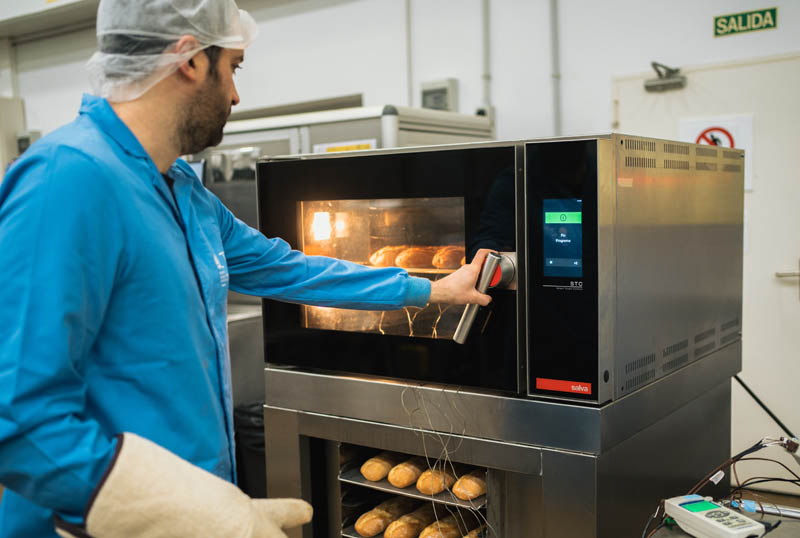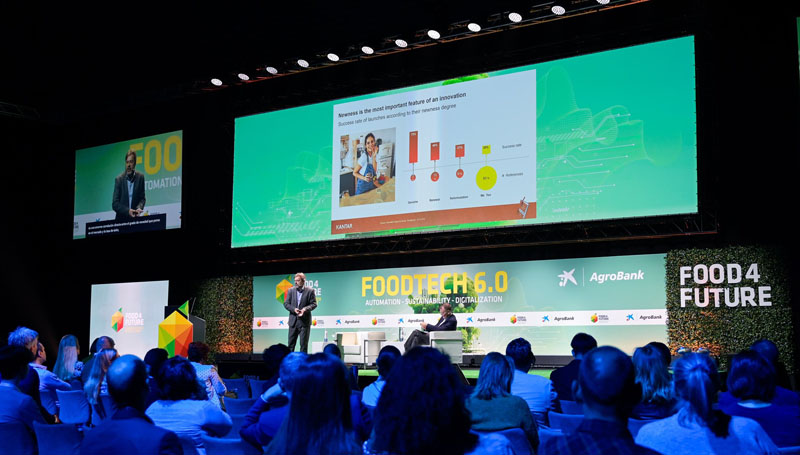The future of marine resources and its impact on food security
Últimas noticias
Una mirada LGTBIQ+ al reino animal
Circular Economy in Action: Valorisation of By-products through Projects like PRIMA NEWFEED
Strategic Perspectives: Highlights from the Food4Future World Summit for Business Leaders
ALEX BARRANCO and HUGO CUNHA, food safety experts at AZTI
The relevance of the ocean for food and food security is undeniable, especially in a world where the population is growing steadily and land resources are becoming increasingly scarce. The prospective research ‘Navigating Tomorrow’s Tide: Exploring the Future of Ocean Resources and Their Impact on Food and Feed Safety’, carried out by a multidisciplinary team from AZTI in collaboration with CIIMAR for the European Food Safety Agency (EFSA), provides an exhaustive analysis of how global changes could affect the use of the oceans and, consequently, the food safety of seafood products in Europe.
Representatives from various stakeholders such as the European Maritime Safety Agency (EMSA), the Joint Research Centre (JRC), the European Commission’s Directorate-General for Maritime Affairs and Fisheries (DG-MARE), the European Commission’s Directorate-General for Health and Food Safety (DG-SANTE), as well as several European universities and research centres have been involved in the different stages of the analysis.
Based on this research, this article summarises the challenges and opportunities facing the exploitation of ocean resources and how these could influence the future of food and food safety.
Índice de contenidos
The importance of marine resources for food safety and security
The oceans, covering 70% of the planet’s surface, are essential for global food security. They are not only a source of food, but also play crucial roles in the ecosystem, such as absorbing carbon dioxide and storing heat. However, the intensive exploitation of these resources, through the emergence of new uses of the ocean or the increase of established ones, poses serious challenges to sustainability and food security. Overexploitation, climate change and pollution are jeopardising the ability of the oceans to provide food safely and sustainably.
The report, developed for EFSA, follows a rigorous methodology based on mapping drivers of change and analysing future scenarios. This approach allows anticipating emerging risks and making informed decisions to mitigate their effects on food security. The study identifies three key uses of the ocean: seabed mining, marine aquaculture, and maritime transport and trade, assessed under three possible scenarios for 2050, each with specific implications and risks for food and food security.
1. Seabed mining: wealth and risk on the deep seabed
Marine mining responds to the demand for essential minerals for advanced technologies, such as batteries and other electronic devices. However, this activity has the potential to severely damage marine ecosystems, affecting food security. The scenarios assessed help to understand how different levels of regulation and demand could influence the impact of this activity.
Scenario 1: Moderate demand for minerals and strict regulation
In this scenario, demand for minerals is moderate and strict regulations with advanced technologies are applied to mitigate environmental impacts. However, the long-term effects of pre-regulation mining operations persist, leading to a decline in demersal species and a potential impact on food availability due to reduced fish stocks.
Scenario 2: High mineral demand and limited regulation
With high demand for minerals and lax regulation, this scenario implies an increased risk of pollution, which could make seafood products unsafe due to the presence of residues of pollutants from mining activities. In addition, the nutrient content of interest in mining by-products may promote their use in food and feed, which makes it essential to analyse the possible associated risks.
Scenario 3: Stable demand for minerals with lax regulations
This scenario presents a steady demand for minerals with ambitious regulations, but insufficient control. This increases the risk of pollution and destruction of marine habitats, affecting both ecosystems and the food chain.

2. Marine aquaculture: a solution with great challenges
Aquaculture is an activity that meets the growing demand for seafood. By 2030, 62% of fish for human consumption is expected to come from aquaculture, but aquaculture also faces challenges from climate change and ocean pollution.
Scenario 1: Sustainable aquaculture and species diversification
This scenario proposes aquaculture geared towards sustainability and species diversification, through integrated multi-trophic systems that help reduce environmental impact. However, offshore production faces challenges, especially due to competition for maritime space and the constraints imposed by climate change.
Scenario 2: Intensive species-specific production
In this model, production is concentrated on specific species and farming intensity is increased, which may disrupt ecosystems and jeopardise the safety of seafood products due to emerging pathogens and/or contaminants.
Scenario 3: Intensive production and diversification
In a context of limited governance, poorly defined strategy and lack of international standards, the unregulated use of antibiotics is an element that compromises the quality of aquaculture products and has consequences for public health.
3. Maritime transport and trade: challenges for sustainability
Maritime transport is crucial for global trade and its implications for food security have been analysed under three future scenarios:
Scenario 1: Rapid transition to sustainable fuels.
This scenario envisages a rapid transition to more sustainable fossil fuel alternatives, which could significantly reduce carbon emissions. However, geopolitical tensions, changes in marine ecosystems due to increased shipping, and lack of knowledge of the real impact of new alternatives could affect food security.
Scenario 2: Moderate commitment to sustainable alternatives
In this scenario, ammonia is presented as the fuel of the future in order to achieve zero impact. However, the cost of fuel is rising, leading to higher food prices. In addition, shipping continues to grow and therefore the potential food security risks associated with it need to be analysed.
Scenario 3: Fossil fuels and global tensions
This scenario maintains dependence on fossil fuels, which increases CO2 emissions and favours climate change. Global warming leads to the emergence of new maritime routes, facilitating the spread of invasive species and affecting the sustainability and safety of seafood products.
Emerging issues and food safety risks
The report highlights several emerging issues, associated with the scenarios presented above, that may put food security at risk in the future. These include emerging marine toxins, antimicrobial resistance, the emergence of new parasites, residues from weapons and warfare products, and the accumulation of chemicals such as heavy metals and rare earth elements. These risks can have a direct impact on the quality and safety of seafood, which calls for strict regulation and food risk assessment to protect consumers. Climate change may also enhance the emergence or increase of pathogens and allergens in marine species, which represents an additional challenge for food safety.
Recommendations for EFSA
In the face of these challenges, the report proposes key recommendations to improve sustainability and food safety at European level:
- Improving communication: Strengthening communication between the scientific community, industry and regulators is essential to anticipate risks and adapt food safety policies.
- Multidisciplinarity: Integrating data from different fields of study of the ocean and its resources will improve knowledge and facilitate the adoption of appropriate measures to prepare for the new challenges of the future.
- Increasing capacities in risk analysis: In order to make the right decisions, it is necessary to consider many factors, to have all the (often complex) information available, and to have the capacity to be able to integrate it into harmonised and accepted methodologies. This is essential to reduce environmental impacts and protect public health.
- Alignment of strategies and policies: It is crucial that all strategies and policies are aligned in pursuit of common objectives, avoiding conflicts and discrepancies between different competencies.
A future of shared responsibility
The future of ocean resources and their impact on food security will depend on responsible management and effective collaboration between the scientific community, regulators and industry. The sustainability of seafood requires a balance between demand and ecosystem conservation.
Research Citation: EFSA (European Food Safety Authority), Barranco A, Cunha-Silva H, Aranda M, Mader J, Cotano U, Ramos P, Camacho C, Gomes S, Oliveira H, Nunes ML, 2024. Navigating Tomorrow’s Tide: Exploring the Future of Ocean Resources and Their Impact on Food and Feed Safety. EFSA supporting publication 2024. 268 pp. doi:10.2903/sp.efsa.2024.EN-9058







